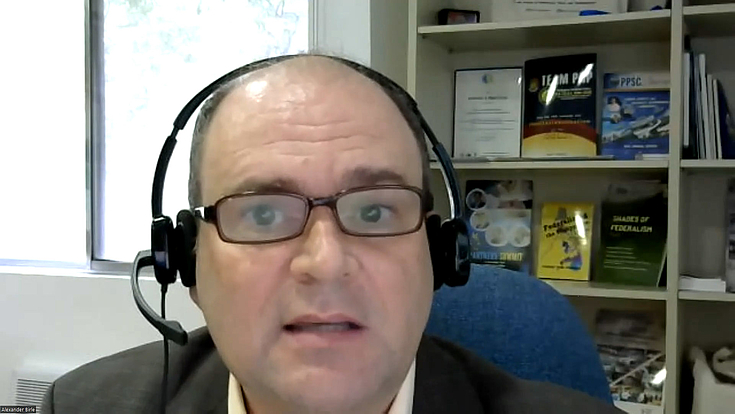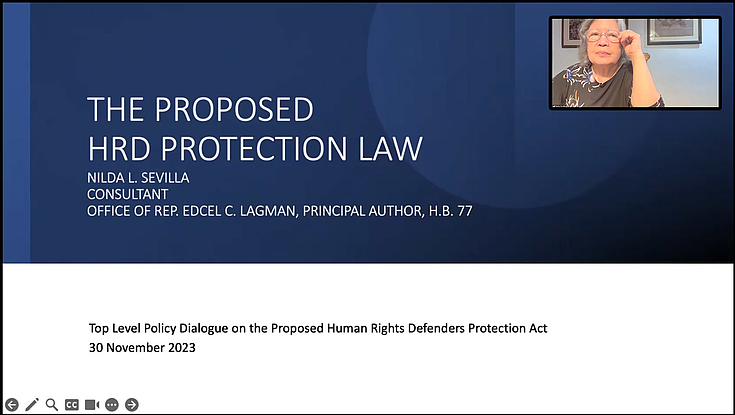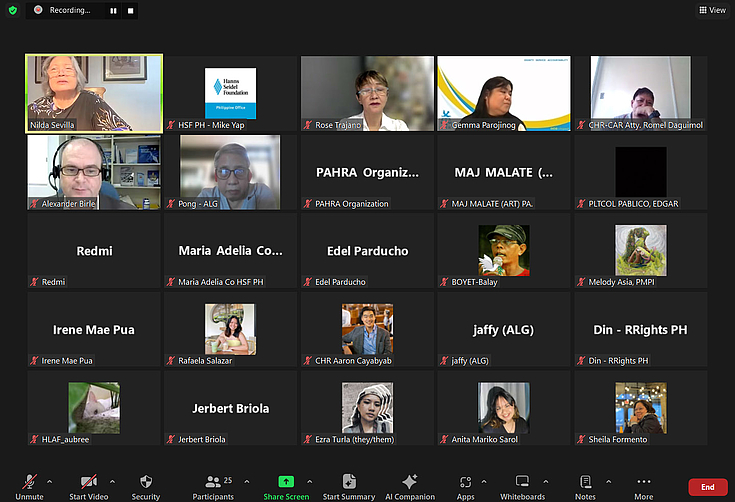Community-based Dialogues (CBD)
Top-Level Policy Dialogue on the Proposed Human Rights Defenders Protection Act (HRDPA)

HSF
After the preliminaries, Mr. Rene Clemente, ALG Program Officer, presented an overview of the CBD project since its inception in 2008.
Mr. Alexander Birle, HSF Resident Representative gave the Welcome Remarks. He shared the development goal and objectives of HSF in the Philippines. He acknowledged the importance of the Community-based Dialogue project as part of the longstanding partnership between the government and civil society. He noted the Top-Level Policy Dialogue is a good platform to discuss policy gaps and recommendations as well as policy reforms to promote and protect human rights and improve the relationship between the security sector and civilians. He also mentioned the Feedback and Referral System (FRS) for monitoring and reporting human rights violations which was developed this year and being piloted in the Cordillera region.
Ms. Nilda Sevilla, Consultant to the Office of Congressman Edcel Lagman, presented key features of the Proposed Human Rights Defenders (HRD) Protection Law or House Bill 77, viz: definition of HRD, rights and freedoms of HRDs, obligations of the State and public authorities, and HRD Protection Committee. She said the focus of the bill is the legal protection of HRDs, subject to several limitations and rights prescribed by law. She appreciated the partnership, cooperation and collaboration of the participants and organizers of the TLPD. She also mentioned some sector’s opposition to the bill, in particular, the National Task Force to Ending Local Communist Armed Group (NTF-ELCAC), which it considers a threat to democracy of all Filipinos.
The following reactors shared their comments on the bill:

HSF
- CHR – in support of the legislation of the bill, conducted 3 major activities-survey, roundtable discussion with senators, and recommended for UNJP priority legislation; recognize unique, highly risky work of HRDs; protection mechanism for the work they do for the public; Constitution is not self-executing thus the need for a specific law; despite early hesitance, bill is gaining traction in the Senate; hopefully will become a law; areas with HRDP ordinances are Isabela (Basilan), Puerto Princesa (Palawan), Digos (Davao del Sur)
- Atty. Romel Daguimol, CHR-CAR Regional Director – Baguio City’s draft ordinance on HRDP bill passed on second reading was referred back to Committee on Human Rights for review of penal provisions and mechanisms for implementation; there are some challenges e.g., definition of red-tagging and reservations from PNP; hopes to finalize the ordinance and pass on third reading then voting; it is a requirement to have an HRDP ordinance before being declared as Human Rights City
- Police Lt. Col. Edgar Pablico, Chief, Advocacy and Promotion Division, PNP HRAO – who will be qualified as HRD? [Ms. N. Sevilla said anyone can be an HRD subject to requirements of the bill]. The bill is a duplication of CHR’s mandate and functions, and undermines the Anti-Terrorism Law (ATL) and Anti-Money Laundering Act (AMLA).
- AFP – no comment for now
- PAHRA – the bill is welcome to CSOs which recognizes their work, empowers them, and serves as legal framework for their safety and security; it reinforces right to speech without fear of reprisal; compliance to international standards; address violations of government officials
- ALG – implement specifics of the proposed law

HSF
Recommendations:
(i) lobby offices of Senate President and House Speaker to get their commitment for the passage of the bill
(ii) review other human rights laws that may weaken the bill, or restrict rights of HRDs for reasons of peace and order and national security
(iii) hold dialogues/summit/bilateral discussion to resolve conflicting provisions; recognize/ harmonize differences; DOJ can hold FGD among government agencies
